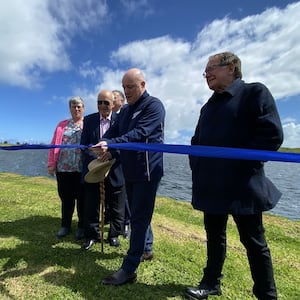Business
Business Leaders Call for Stronger Bipartisanship on Infrastructure

Business leaders are advocating for increased bipartisanship in government policy-making, particularly regarding infrastructure development. This push stems from a desire for long-term certainty and consistency in policy, especially following years of fluctuating signals in areas such as energy, water, and planning.
According to Phil O’Reilly, a prominent figure at the intersection of business and politics, true policy stability in New Zealand rarely emerges from mere agreement between political parties. Instead, it arises when both sides recognize mutual benefits in achieving broadly similar outcomes. This perspective highlights a critical distinction: what is often perceived as consensus may actually be a convergence of political self-interest.
The Need for Genuine Engagement
O’Reilly emphasizes that lasting alignment in policy requires more than just calls for bipartisanship. It necessitates evidence-based discussions and active engagement between parties. While the idea of politicians working together across the aisle is appealing, achieving true bipartisanship is often more complex. The reality is that political self-interest can lead to a balance of power, which, in turn, can foster an environment conducive to effective policy-making.
The business community’s call for stability is not unfounded. Companies operating in sectors impacted by infrastructure policies need assurance that their investments will not be undermined by abrupt shifts in government direction. This need for consistency has become particularly pressing as businesses navigate the challenges posed by environmental changes and the evolving needs of society.
Long-Term Certainty as a Business Imperative
In O’Reilly’s view, the quest for stability in infrastructure policy is essential for fostering a robust business environment. When both political sides can align on key outcomes, it creates a framework that encourages investment and innovation. This alignment is crucial not only for large corporations but also for smaller enterprises that depend on clear and stable regulations to thrive.
The reality of political dynamics means that the path to effective infrastructure policy may not always be straightforward. Nevertheless, O’Reilly argues that the emphasis should be on fostering genuine dialogue and collaboration rather than simply demanding bipartisan agreements. By focusing on shared objectives and the common good, policymakers can work towards creating a more stable and predictable environment for businesses.
In conclusion, the call for increased bipartisanship in infrastructure policy reflects a broader desire for stability in an ever-changing landscape. While true consensus may be challenging to achieve, prioritizing engagement and finding common ground can pave the way for more effective and lasting policy outcomes.
-

 World1 week ago
World1 week agoPrivate Funeral Held for Dean Field and His Three Children
-

 Top Stories2 weeks ago
Top Stories2 weeks agoFuneral Planned for Field Siblings After Tragic House Fire
-

 Sports3 months ago
Sports3 months agoNetball New Zealand Stands Down Dame Noeline Taurua for Series
-

 Entertainment3 months ago
Entertainment3 months agoTributes Pour In for Lachlan Rofe, Reality Star, Dead at 47
-

 Entertainment2 months ago
Entertainment2 months agoNew ‘Maverick’ Chaser Joins Beat the Chasers Season Finale
-

 Sports3 months ago
Sports3 months agoSilver Ferns Legend Laura Langman Criticizes Team’s Attitude
-

 Sports1 month ago
Sports1 month agoEli Katoa Rushed to Hospital After Sideline Incident During Match
-

 World2 weeks ago
World2 weeks agoInvestigation Underway in Tragic Sanson House Fire Involving Family
-

 Politics2 months ago
Politics2 months agoNetball NZ Calls for Respect Amid Dame Taurua’s Standoff
-

 Top Stories2 weeks ago
Top Stories2 weeks agoShock and Grief Follow Tragic Family Deaths in New Zealand
-

 Entertainment3 months ago
Entertainment3 months agoKhloe Kardashian Embraces Innovative Stem Cell Therapy in Mexico
-

 World4 months ago
World4 months agoPolice Arrest Multiple Individuals During Funeral for Zain Taikato-Fox





















